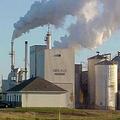 美國與歐盟以糧食作物製造生質燃料,是造成糧價暴漲的罪魁禍首,在28日的日內瓦記者會上,瑞士籍的聯合國糧食權利問題特別報告員齊格勒(Jean Ziegler)表示,歐美的燃料政策是目前全球糧食危機的主要原因之一。
美國與歐盟以糧食作物製造生質燃料,是造成糧價暴漲的罪魁禍首,在28日的日內瓦記者會上,瑞士籍的聯合國糧食權利問題特別報告員齊格勒(Jean Ziegler)表示,歐美的燃料政策是目前全球糧食危機的主要原因之一。
齊格勒指出,美國2007年使用了1/3的玉米產量製造生質燃料,而歐盟則計畫將生質燃料佔燃料供應的比例提高至10%。他呼籲應暫時停止種植生質燃料5年。齊格勒並指出糧食價格上漲的原因,有3成來自國際市場的預期心理
他也提到,像是卡基爾(Cargill)這樣的公司,掌握全球1/4的穀物產量,對市場擁有龐大的操控能力,而對沖基金(hedge funds)也從期貨市場獲得暴利。齊格勒因此呼籲訂定新的金融制度以防範類似的投機行為。
但也有人對此抱持相反意見。美國內布拉斯加州的「乙醇推廣資訊協會」執行主任紐恩保(Toni Nuernberg)表示,「我願意嚴正聲明,生產乙醇不會奪走食物讓人挨餓。 生產乙醇使用的是飼料玉米(field corn),絕大多數原本供應牲畜食用,僅少部份作成早餐穀片或零食。」
他在22日指出,「製造乙醇只需要玉米仁的澱粉,至於維他命、礦物質、蛋白質與纖維素等其他成份,都另外用在其他產品,例如糖漿、玉米油,還有幫助畜牧業者提高整體糧食產量的高級飼料等。」
紐恩保認為糧價與油價上升有關,因為耕種的機械設備與載運糧食到市場的卡車都需要使用燃料。
世界銀行9日所發表的報告則與聯合國觀點一致,認為是生質燃料產量增加才導致糧價上漲。各國政府為因應油價升高、能源安全與氣候變化等問題,紛紛加速生產生質燃料,對小麥、大豆、玉米與棕櫚油等原物料的需求也因此增加。其他造成糧價攀升的因素還包括能源與肥料價格增高、美元貶值與各國限制出口。
 聯合國糧食與農業組織(FAO)最新的研究顯示,開發中國家加速投入大規模生產液態生質燃料,會造成鄉村地區的婦女更加邊緣化。
聯合國糧食與農業組織(FAO)最新的研究顯示,開發中國家加速投入大規模生產液態生質燃料,會造成鄉村地區的婦女更加邊緣化。
報告作者之一的蘭布勞(Yianna Lambrou)表示,「除非開發中國家能制定政策,提高小農--特別是婦女--栽種生質燃料的比例,在取得土地、資本與技術上給予協助,否則性別不平等的問題將惡化,婦女也會更無力抵擋飢餓及貧窮的威脅。」
糧價格預計在今年與2009年都會持續走高,之後雖然逐漸趨緩,但在2015年以前,大部份的糧食價格都可能遠高於2004年的水準。
The United States and the European Union have taken a "criminal path" by contributing to an explosive rise in global food prices through using food crops to produce biofuels, the United Nations special rapporteur on the right to food said today.
At a press conference in Geneva, Jean Ziegler of Switzerland said that fuel policies pursued by the U.S. and the EU were one of the main causes of the current worldwide food crisis.
Ziegler said that last year the United States used a third of its corn crop to create biofuels, while the European Union is planning to have 10 percent of its petrol supplied by biofuels. The Special Rapporteur has called for a five-year moratorium on the production of biofuels. Ziegler also said that speculation on international markets is behind 30 percent of the increase in food prices.
He said that companies such as Cargill, which controls a quarter of all cereal production, have enormous power over the market. He added that hedge funds are also making huge profits from raw materials markets, and called for new financial regulations to prevent such speculation.
But not everyone agrees. Toni Nuernberg, executive director of the Ethanol Promotion and Information Council based in Omaha, Nebraska, says, "I can unequivocally state that ethanol does not take food from the mouths of starving people."
"Ethanol production uses field corn - most of which is fed to livestock with only a small percentage going into cereals and snacks. In fact, only the starch portion of the corn kernel is used to produce ethanol. The vitamins, minerals, proteins and fiber are converted to other products including sweeteners, corn oil and high-value livestock feed - feed which helps livestock producers add to the overall food supply," said Nuernberg on Tuesday.
Nuernberg relates rising energy costs to food bills, as growers fuel tractors and machinery and truckers transport foodstuffs to market.
A World Bank report issued April 9 agrees with the UN officials.
Increased bio-fuel production has contributed to the rise in food prices, according to this report. Concerns over oil prices, energy security and climate change have prompted governments to increase bio-fuel production and use leading to greater demand for raw materials including: wheat, soy, maize and palm oil.
Food price hikes are also linked to higher energy and fertilizer prices, a weak dollar and export bans.
Rapid increases in the large-scale production of liquid biofuels in developing countries could increase the marginalization of women in rural areas, threatening their livelihoods, according to a new study by the UN Food and Agriculture Organization, FAO.
"Unless policies are adopted in developing countries to strengthen the participation of small farmers, especially women in biofuel production by increasing their access to land, capital and technology - gender inequalities are likely to become more marked and women vulnerability to hunger and poverty further exacerbated," said Yianna Lambrou, co-author of the paper.
Food crop prices are expected to remain high in 2008 and 2009 and then begin to decline, but they are likely to remain well above the 2004 levels through 2015 for most food crops.
全文及圖片詳見:ENS




